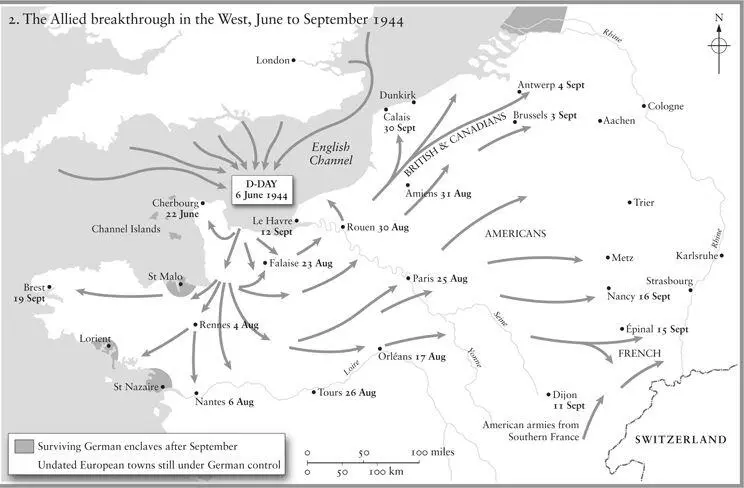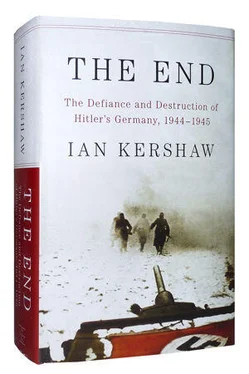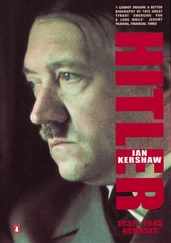
Unexpectedly, however, the Allied advance stalled. The aim evinced at the beginning of September by the Allies’ supreme commander, General Dwight D. Eisenhower, of pressing forward to the Reich borders on a broad front before German defences could be consolidated soon proved an impossibility.
The Allies fared worst in the northern sector. Serious tactical errors brought the advance there to a halt. The arrogant British commander, Field-Marshal Bernard Montgomery, impatient to exploit the German disarray and press boldly ahead into the Ruhr and on to Berlin, made costly mistakes that vitiated his aims—headstrong and immensely risky as these would have been anyway. The conflict of strategy and personality between Montgomery and Eisenhower was unquestionably damaging to the Allies at this vital time. Montgomery’s failure to exploit the important capture of the undestroyed Antwerp port by pressing forward to secure the Scheldt estuary left the crucial port unusable until the end of November and allowed large numbers of German troops who could have been cut off in the area to escape. This was compounded by the disaster at Arnhem, where Montgomery’s insistence on a daring airborne assault to cross the Rhine resulted in high British losses. The risky offensive ‘Market Garden’ began on 17 September but was in effect already over three days later. From then on, hopes of a rapid advance across the Rhine and into Germany’s industrial heartland, the Ruhr, had to be abandoned.
On the southern sector of the front, the US Third Army under General George Patton had sped eastwards during the second half of August, crossed the Meuse and reached the Mosel. Patton was optimistic that he could drive on into Germany, and that the war could be rapidly won. The first step was to press over the Mosel into Lorraine. The important industrial belt of the Saar beckoned thereafter. But in early September Patton’s advance slowed almost to a halt. His supply line to Cherbourg was almost 650 kilometres long. His tanks were simply running out of fuel. And Eisenhower had given priority for the time being to Montgomery’s intended drive into the Ruhr. A furious Patton was held back. As his rapid advance became almost immobilized, German defences facing his attacking forces were urgently strengthened and placed under the command of the redoubtable General Hermann Balck, battle-hardened from the eastern front and high in Hitler’s favour. The momentum had been lost. It would be a further two months and much hard fighting before fierce German resistance at Metz, the fortress heartland of Lorraine, would be overcome. 5
The best prospects lay in the central sector of the front. The US First Army, under General Courtney Hodges, advancing north-eastwards from the Paris area in late August, had destroyed several German panzer divisions, taking 25,000 prisoners, before reaching Mons, in Belgium. Part of the army, the V US Corps, then turned south-east to advance through Luxemburg and almost to the German border near Trier by 11 September, while the VII US Corps drove directly eastwards towards Aachen. Around 6 p.m. on 11 September, the first American troops set foot on German soil, just south of Aachen, a city by now largely free of defending troops and with a panic-stricken population. But the Americans pressed their advance over too wide an area. German forces regrouped and, through tenacious fighting, blocked the larger and stronger American forces. Within five days, reinforced German units had succeeded in repulsing the American attack. German authorities were able—for the time being—to restore their control over Aachen and prevent any American breakthrough in the direction of Cologne. Another chance had been missed. It would take a further five weeks of bitter fighting before Aachen became the first German city to fall into Allied hands, on 21 October. And it would be nearly six months before Cologne, only 90 kilometres or so away, was taken.
Meanwhile, Rundstedt had been recalled as Commander-in-Chief West (in overall command of the army in that theatre) on 5 September, leaving Model, a brilliant defence strategist, to take charge of Army Group B (one of two Army Groups on the western front; the other, Army Group G, was commanded by Colonel-General Johannes Blaskowitz). Under Model’s command, the German defences, helped by shortened supply lines and hardened reinforcements, both salvaged from Normandy and brought across from the eastern front, had been strengthened. By mid-September the Allies stood close to the German border over a long stretch of the front from Belgium almost to Switzerland. But it was now clear that expectations which the Allies had held for months, drawing on the experiences of the First World War, of the sort of German collapse that had happened in 1918 were misplaced. 6The war was set to drag on. 7
The Allies had shown hesitation and made costly errors at crucial junctures. But the Germans had made their own major contribution to prolonging the war. For Germany, despite fierce and courageous fighting by the outnumbered forces of the Wehrmacht, the collapse in France had come as a dreadful shock. Within a little over three months, the Allies had liberated France and reached Germany’s borders. Soon, it was evident, the war would be fought on German soil. Under Model’s able command, however, they had survived the critical, but not fatal, defeat near Falaise. Since then, they had surprised the Allies with the tenacity, even fanaticism, of their fighting. Though outnumbered, they had shown energy and initiative. And they had some technically superior weaponry and tanks—if in insufficient quantities. The main weakness was not on the ground, but in the air, where the Luftwaffe was increasingly paralysed and Allied superiority immense. 8Even so, German defence was stubborn, and not easy to break down. Unlike the Russian army in 1917, the German army the following year, the Italian army in 1943, or other instances where heavy defeats had produced a collapse in morale with devastating political consequences, the German armed forces in late summer and autumn of 1944 were far removed from the point at which they were unwilling to fight on any further. What lay behind the extraordinary tenacity of the fighting front in the west?
Had the Allies seen reports that were reaching the German leadership at this time on the demoralization among the German civilian population on the western borders of the Reich and within the Wehrmacht produced by the disastrous military collapse in the west, they might have been encouraged in their ‘collapse theory’ based upon the events of 1918. 9Such reports certainly did not give the impression that Germany was capable of fighting on for a further eight months.
A sense of relief in Germany that the eastern front appeared to be stabilized was said to have been dissipated in mid-August through the depressing news of the Allied breakthrough in the west, for which the population had been completely unprepared. 10Optimists suggesting that the war could yet be won with a supreme effort had a hard time in the gathering gloom of opinion about the huge superiority of enemy forces, scepticism about the promised new ‘wonder weapons’, and feelings that the total-war effort, though generally welcome, had come too late and would, in any case, not be evenly spread in its burdens. Letters from loved ones at the front, and even official news bulletins from France, were cited as indicators that Germany could not compete with the Allied supremacy in men and weaponry. ‘I don’t believe we’ll be able to stop the storm of the enemy,’ one quoted letter home ran. ‘Their superiority is far too great, in the air and above all with tanks, tanks and still more tanks.’ ‘Where are the great reserves that have always been talked about?’ people were asking. In the depressed mood, the desire for an early end to the war was all the stronger, and with it the view that the consequences of defeat would be less dreadful than claimed. Scepticism and defeatism were becoming inseparable. 11
Читать дальше













